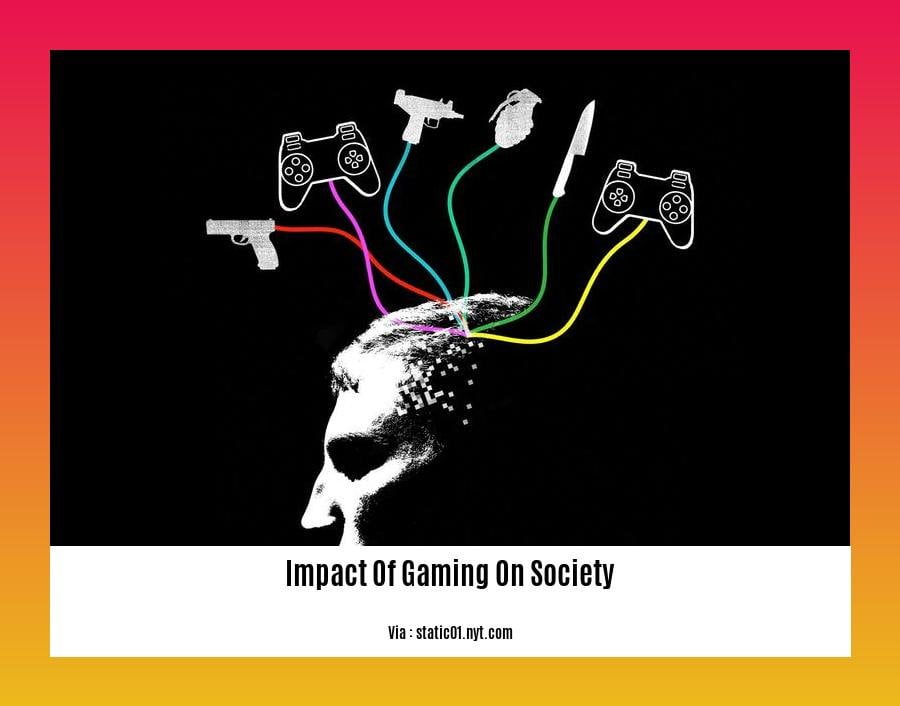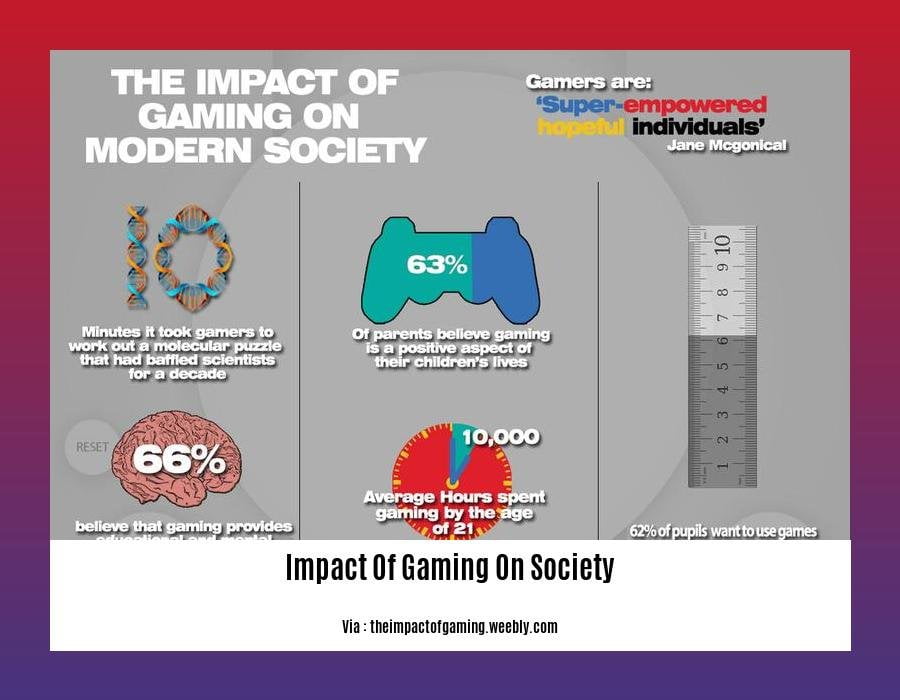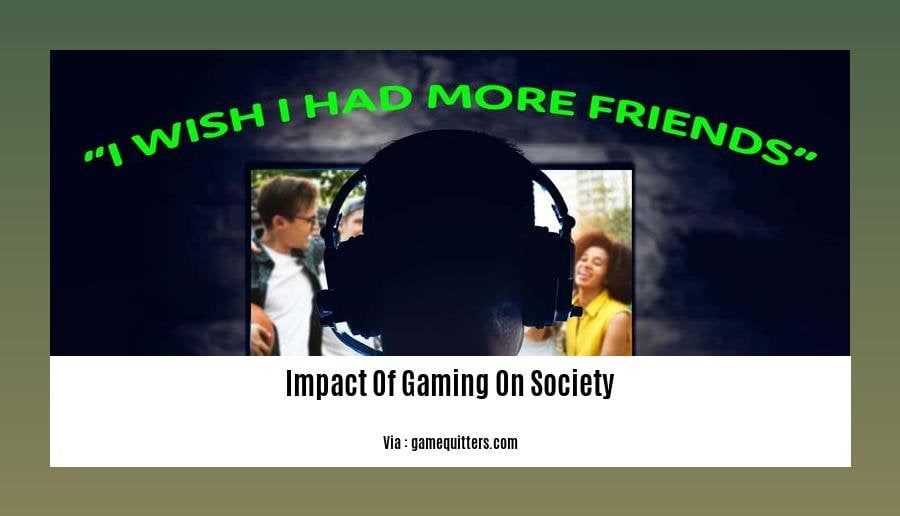Welcome to “The Impact of Gaming on Society: A Multifaceted Analysis.” This article delves into the profound influence of gaming on various aspects of our lives, exploring its psychological, social, and cultural implications. Whether you’re a seasoned gamer or simply curious about the role technology plays in shaping our world, this analysis will provide you with a comprehensive understanding of the impact of gaming on society.
Key Takeaways:
- Educational games can promote life skills and personal growth.
- Gaming elements aid in patient recovery in the medical field.
- Video games impact the production and consumption of media, including music and film.
- Gaming influences social interactions, education, and economic trends.
- Games can enhance decision-making and strategic thinking.
- Potential drawbacks include social isolation, neglect of education, and addiction.
Impact of Gaming on Society

Gaming has become an integral part of our lives, with a vast impact on society, both positive and negative.
Positive Impacts:
- Cognitive benefits: Gaming improves problem-solving, memory, and attention skills.
- Social benefits: Online multiplayer games foster connections and promote cooperation.
- Economic benefits: The gaming industry creates jobs and drives innovation.
Negative Impacts:
- Addiction and excessive use: Excessive gaming can lead to addiction and neglect of other aspects of life.
- Health concerns: Prolonged gaming can contribute to obesity, eye strain, and other health issues.
- Violence and aggression: Some games depict violent content that may desensitize players.
Societal Concerns:
- Impact on education and employment: Gaming can be a distraction, interfering with school and work.
- Role in social isolation and polarization: Prolonged gaming can lead to isolation and exacerbate social divisions.
- Regulation and policy considerations: Regulating the gaming industry to mitigate negative impacts remains a complex and ongoing challenge.
Balancing Benefits and Risks:
The impact of gaming on society is a multifaceted issue. While gaming offers numerous benefits, it’s crucial to address the potential risks. By fostering a balanced approach that promotes responsible gaming, we can maximize the benefits and minimize the negative consequences.
Are you curious to know about the history of gaming? Want to know how video games became so popular? Or are you interested in learning about the evolution of gaming consoles? We have covered all this and more in our early video games article. Click on these links and dive into the fascinating world of gaming!
Societal Concerns

In the realm of gaming, Societal Concerns arise as a tapestry of interwoven issues, weaving together the intricate threads of education, employment, social isolation, and polarization.
Education and Employment
As the allure of virtual worlds beckons, some fear a potential detrimental impact on academic pursuits and career aspirations. Gaming may consume students’ time, diverting their focus from studies and potentially compromising their academic performance. However, it is important to note that certain games can also enhance cognitive skills and problem-solving abilities.
Similarly, concerns exist about the impact of gaming on the workforce. Excessive gaming can lead to reduced productivity, absenteeism, and impaired decision-making skills. However, the industry also offers opportunities for employment in software development, content creation, and esports.
Social Isolation and Polarization
While gaming can foster connections online, excessive engagement can contribute to social isolation. As individuals retreat into virtual worlds, they may neglect real-world relationships and activities. Moreover, some games can reinforce stereotypes and promote negative social behaviors, potentially exacerbating societal polarization.
Regulation and Policy Considerations
The potential negative consequences of gaming have raised concerns about the need for regulation. Governments and industry leaders are engaged in ongoing debates about age restrictions, content ratings, and measures to combat addiction. However, striking the right balance between safeguarding players and preserving freedom of expression remains a challenge.
Key Takeaways:
- Gaming raises concerns about its impact on education, employment, social isolation, and polarization.
- Excessive gaming may lead to decreased academic performance and reduced productivity.
- Games can foster connections online, but they can also contribute to social isolation.
- Regulation of gaming remains a complex issue, balancing player protection and freedom of expression.
Citation: The Impact of Gaming on Society
Balancing Benefits and Risks
We all know about the dangers of gaming like addiction and negative physical impacts. But games also provide cognitive benefits, enhance social interaction, and have economic benefits. So, how do we strike a balance between the benefits and risks?
Cognitive Benefits:
Multiplayer and online games can foster teamwork and communication skills, and some games help improve problem-solving, memory, and attention.
Social Benefits:
Cooperative games can create a sense of community and friendship, promoting collaboration and cooperation.
Economic Benefits:
The gaming industry creates jobs, ranging from game development to esports, and drives innovation in technology and entertainment.
Negative Impacts:
Excessive gaming or engagement in violent video games has been associated with negative mental health issues, sleep problems, and aggressive behavior.
Balancing Benefits and Risks:
Finding a balance is key. To balance benefits and risks, consider:
- Set limits on gaming time and encourage breaks.
- Encourage participation in non-digital activities to promote a balanced lifestyle.
- Monitor and discuss gaming content to mitigate potential negative influences.
Key Takeaways:
- Games can provide cognitive benefits, social interaction, and economic opportunities.
- Excessive or violent gaming can lead to negative physical and mental health impacts.
- Responsible gaming practices and education can help balance benefits and risks.
Citation:
Gamequitters. (n.d.). The Social Effects of Video Games.
Recommendations for Future Development
The rise of gaming has transformed entertainment and society alike. While it offers undeniable benefits, it’s crucial to address its potential risks. To ensure a healthy future for gaming, I propose the following recommendations:
Balancing Gaming with Life:
- Promote responsible gaming practices that prioritize balance and moderation.
- Encourage parental involvement in monitoring children’s gaming habits.
- Integrate educational campaigns highlighting the importance of real-world engagement beyond gaming.
Promoting Diversity and Inclusion:
- Increase representation of diverse backgrounds and perspectives in game design and development.
- Encourage game companies to create games that promote social inclusion and challenge stereotypes.
- Support organizations working towards equity and accessibility in the gaming industry.
Mitigating Health Concerns:
- Establish guidelines for limiting screen time and promoting physical activity during gaming sessions.
- Develop in-game features that promote wellness, such as reminders to take breaks or warnings about the potential for addictive behaviors.
- Invest in research on the long-term health effects of gaming and develop strategies to address potential concerns.
Regulating and Monitoring Gaming:
- Implement age restrictions and parental controls to protect minors from potentially harmful content.
- Regulate loot boxes and microtransactions to prevent predatory practices and problem gambling.
- Establish industry best practices for ethical game design and marketing.
Key Takeaways:
- Gaming offers cognitive, social, and economic benefits but requires responsible use.
- Addressing diversity and inclusion promotes a more equitable and inclusive gaming environment.
- Mitigating health concerns ensures the well-being of gamers.
- Regulation and monitoring safeguard minors and promote ethical practices in the gaming industry.
Citation:
- Newton Investment Management. (2022, August 19). The social impacts of gaming. [Blog post].
FAQ
Q1: How has gaming impacted the educational sector?
A1: Games can incorporate practical life lessons, fostering personal development and cognitive skills like problem-solving and decision-making.
Q2: What are the potential drawbacks of gaming?
A2: Social alienation, isolation from reality, neglect of traditional education, and potential addiction are some of the concerns associated with excessive gaming.
Q3: Can gaming have a positive impact on social interactions?
A3: Yes, online and multiplayer games foster teamwork, communication skills, and a sense of community among players.
Q4: What are the economic benefits of gaming?
A4: The gaming industry contributes significantly to the global economy, creating jobs, fostering innovation, and stimulating the digital art ecosystem.
Q5: How can we mitigate the potential negative impacts of gaming?
A5: Balanced use, parental monitoring, and education about responsible gaming practices are crucial for minimizing the risks associated with excessive gaming.
















